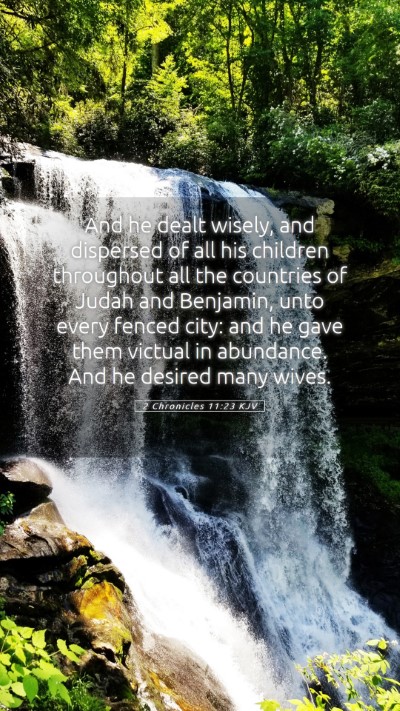Old Testament
Genesis Exodus Leviticus Numbers Deuteronomy Joshua Judges Ruth 1 Samuel 2 Samuel 1 Kings 2 Kings 1 Chronicles 2 Chronicles Ezra Nehemiah Esther Job Psalms Proverbs Ecclesiastes Song of Solomon Isaiah Jeremiah Lamentations Ezekiel Daniel Hosea Joel Amos Obadiah Jonah Micah Nahum Habakkuk Zephaniah Haggai Zechariah MalachiChapter
2 Chronicles 1 2 Chronicles 2 2 Chronicles 3 2 Chronicles 4 2 Chronicles 5 2 Chronicles 6 2 Chronicles 7 2 Chronicles 8 2 Chronicles 9 2 Chronicles 10 2 Chronicles 11 2 Chronicles 12 2 Chronicles 13 2 Chronicles 14 2 Chronicles 15 2 Chronicles 16 2 Chronicles 17 2 Chronicles 18 2 Chronicles 19 2 Chronicles 20 2 Chronicles 21 2 Chronicles 22 2 Chronicles 23 2 Chronicles 24 2 Chronicles 25 2 Chronicles 26 2 Chronicles 27 2 Chronicles 28 2 Chronicles 29 2 Chronicles 30 2 Chronicles 31 2 Chronicles 32 2 Chronicles 33 2 Chronicles 34 2 Chronicles 35 2 Chronicles 36Verse
2 Chronicles 11:1 2 Chronicles 11:2 2 Chronicles 11:3 2 Chronicles 11:4 2 Chronicles 11:5 2 Chronicles 11:6 2 Chronicles 11:7 2 Chronicles 11:8 2 Chronicles 11:9 2 Chronicles 11:10 2 Chronicles 11:11 2 Chronicles 11:12 2 Chronicles 11:13 2 Chronicles 11:14 2 Chronicles 11:15 2 Chronicles 11:16 2 Chronicles 11:17 2 Chronicles 11:18 2 Chronicles 11:19 2 Chronicles 11:20 2 Chronicles 11:21 2 Chronicles 11:22 2 Chronicles 11:23


Understanding 2 Chronicles 11:23
Verse: 2 Chronicles 11:23 - "And he dealt wisely, and dispersed of all his children throughout all the countries of Judah and Benjamin, and sent to them, saying, ‘Go, seek the welfare of your brethren.’"
The interpretation of 2 Chronicles 11:23 provides profound insight into the leadership qualities of Rehoboam as well as the importance of community welfare within Biblical contexts. This verse illustrates the method Rehoboam employed in distributing his children across the regions of Judah and Benjamin, which is significant for its implications on governance, familial bonds, and societal welfare.
Commentary Insights
Henry notes that Rehoboam's decisions reflected his desire to maintain unity and governance over his kingdom. By sending his sons throughout the territory, it ensured a direct influence over the local populations and helped to sustain loyalty. This strategic maneuver emphasizes the leader's role in fostering peace and collaboration among the tribes of Israel.
Barnes highlights the wisdom displayed by Rehoboam, indicating that his actions were deliberately designed to promote peace and stability. He prioritized the welfare of Judah and Benjamin, inviting a sense of unity and responsibility within the family and the broader community. In this context, the verse can be seen as an early principle of leadership that values communal well-being.
Clarke discusses the social dynamics at play, suggesting that Rehoboam's dissemination of his sons served as a preventive measure against factionalism. By ensuring his sons were present among the people, it enabled him to gauge public sentiment and maintain control, which speaks to the necessity of active and attentive governance.
Meaning of the Verse
The verse encapsulates a blend of political acumen and social responsibility. The proactive stance taken by Rehoboam reflects the necessity of leaders to engage with their people, to foster unity, and to cultivate a mutual sense of duty towards the welfare of their compatriots. This can be applied in modern contexts where leaders are encouraged to be hands-on in community involvement.
Application and Relevance
Related Bible Cross References
Conclusion
In summary, 2 Chronicles 11:23 is a reflection on effective leadership and social responsibility. It emphasizes the significance of leaders being present within their communities and the positive outcomes that arise from wise governance. Whether for personal study or group discussion, this verse encourages readers to consider the implications of their roles and contributions within their respective communities.